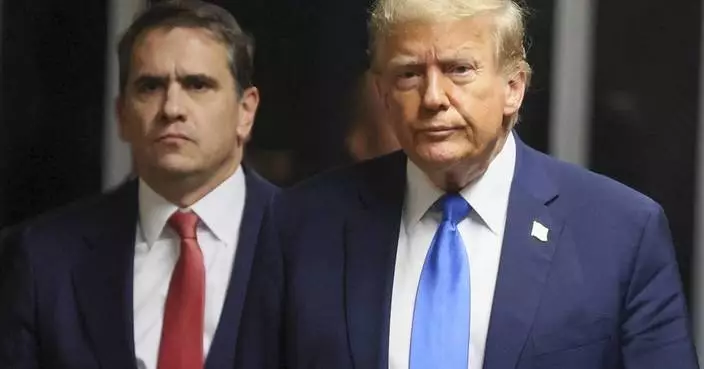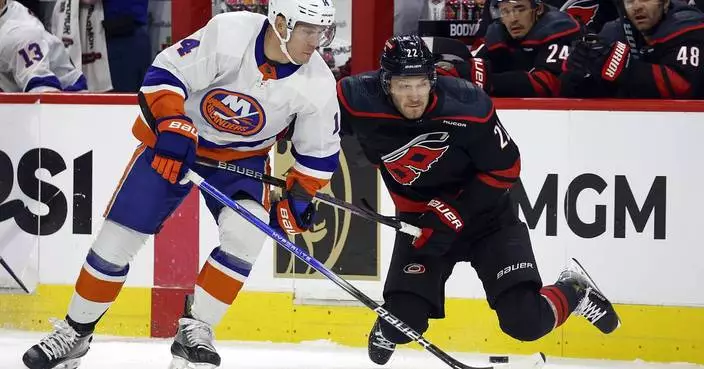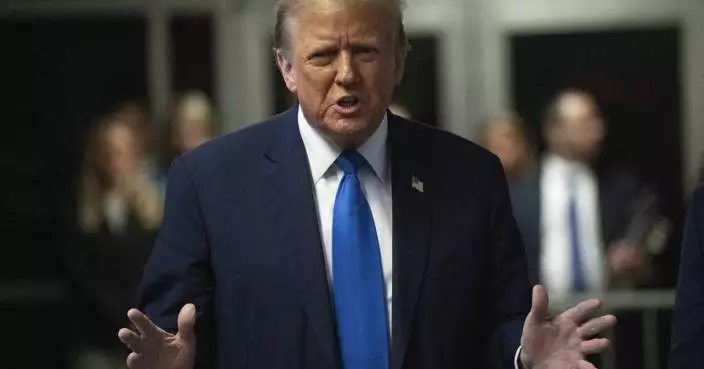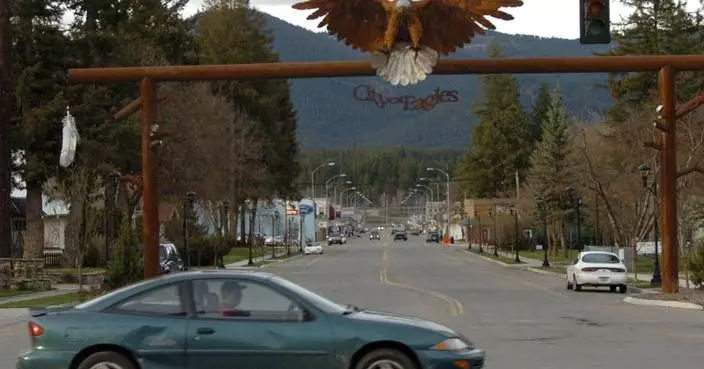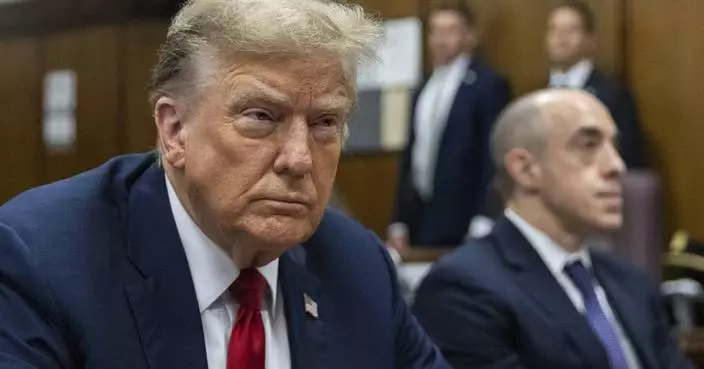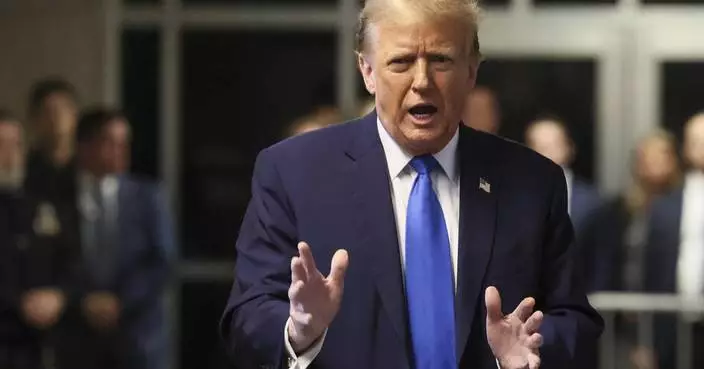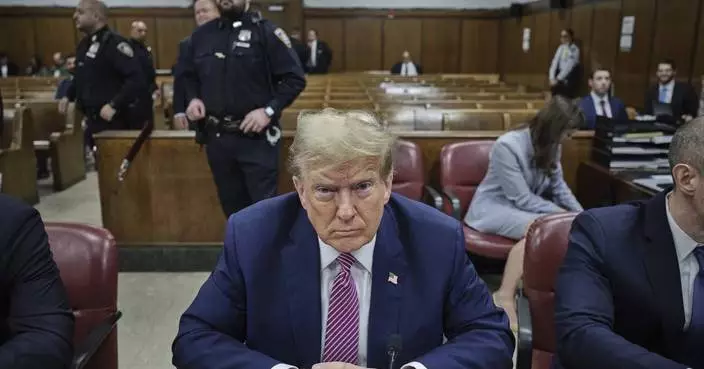President Donald Trump says his deal with North Korea's Kim Jong Un will save tens of millions of people from a potential nuclear war. Now he just has to get everyone else on board.
Frustrated with lukewarm backing from congressional Republicans, criticism from Democratic opponents and skepticism from allies and the media, Trump made a stop on the North Lawn of the White House to promote his agreement with Kim and challenge the blowback that it's vague and lacking in clear objectives.
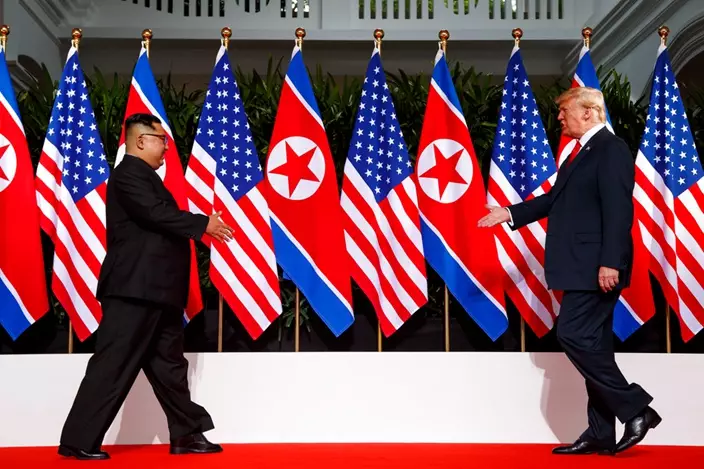
In this June 12, 2018, photo, President Donald Trump meets with North Korean leader Kim Jong Un on Sentosa Island in Singapore. Trump credits his accord with North Korea’s Kim Jong Un with saving tens of millions from nuclear war. Now he just has to get everyone else on board. Frustrated with lukewarm backing from congressional Republicans, criticism from Democratic opponents, and skepticism from allies and the media, President Donald Trump made an extraordinary stop on the North Lawn of the White House Friday to promote the nuclear deal that critics have decried as a vague and lacking in clear objectives. (AP Photo/Evan Vucci)
The surprise appearance Friday on "Fox & Friends," followed by a combative round of questions with reporters, came days after Trump returned from the Singapore summit expecting a hero's welcome and tweeting that the world now could "sleep well."
Trump, who prides himself as a master deal-maker, feels the agreement represents a major step toward solving an intractable foreign policy problem. He has been grumbling that not everyone agrees.
Trump's frustrations are all the more notable now during the honeymoon phase of the deal, when goodwill has yet to be tempered by reality. The U.S. goal of complete, verifiable and irreversible denuclearization, even in the most optimistic case, probably will take years — and that's assuming North Korea won't violate the accord, as it has every previous nuclear agreement.
The president is facing questions about his public embrace of Kim and the North Korean's autocratic leadership style, including what Trump said was a joke about the obedience of the autocratic Kim's advisers. Trump said he was doing what is necessary for peace.
"I don't want to see a nuclear weapon destroy you and your family," Trump told reporters. He added: "If you're fair, when I came in, people thought we were probably going to war with North Korea. ... If we did, millions of people would have been killed."
The joint statement signed this past week by Trump and Kim promises they will work toward a denuclearized Korean Peninsula, but includes no details on how or when weapons might be eliminated or even reduced. The summit marked the first meeting between a U.S. and North Korean leader in six decades of hostility and did mark a reduction in tensions from last fall, when Trump and Kim were trading insults that raised the specter of war.
Trump emerged from the meeting convinced that he could sell the vaguely worded deal, as evidenced by his hour-plus new conference in Singapore immediately after their session. Since then, he has sent out tweets and messages, peaking with his Friday visit to the White House driveway for the impromptu press availability.
"He's his own communications director. Once again his press team is trying to catch up to him," said GOP consultant Alex Conant. "He's focused more on the optics than the policy, which is a trend we've seen throughout this presidency."
In a video message Friday defending the nuclear agreement, Trump said the U.S. must seize the chance to avert nuclear conflict "at all costs."
"Our world has seen more than enough conflict. If there's a chance at peace, if there's a chance to end the horrible threat of nuclear conflict, then we must pursue it at all costs," he said.
Trump believes President Barack Obama would have gotten a different reception. And Trump thinks he should receive credit for making an agreement on an issue where Obama was unable to make progress.
Trump has called lawmakers to express enthusiasm for the agreement, but also complained that he has not had more robust support from GOP lawmakers, said a person with knowledge of those calls, who spoke on condition of anonymity to share internal conversations.
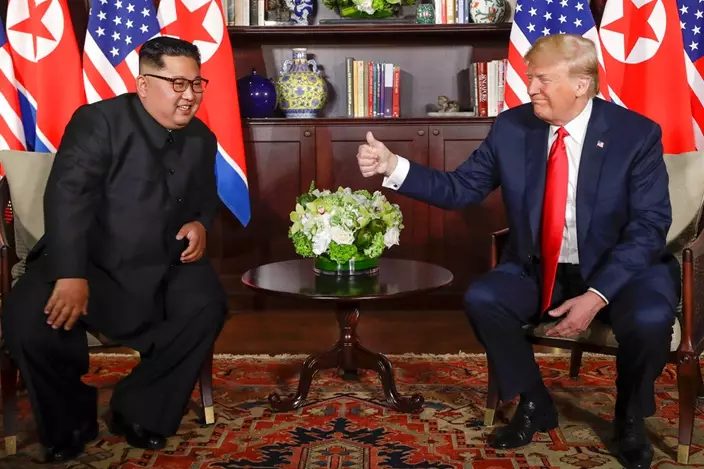
U.S. President Donald Trump gives North Korean leader Kim Jong Un a thumbs up during their meeting at a resort on Sentosa Island in Singapore on Tuesday, June 12, 2018. (AP Photo/Evan Vucci)
Among Trump's most vocal supporters is Secretary of State Mike Pompeo, who led negotiations to set up the summit and will hold talks with the North to work out details of the deal.
The challenge of defending the agreement became apparent this past week when Pompeo lashed out at a reporter who asked how the U.S. would verify the North's compliance with the deal.
"I find that question insulting and ridiculous and, frankly, ludicrous," Pompeo said in Seoul, where he was seeking to reassure U.S. ally South Korea about Trump's negotiation, including a surprise halt to joint military exercises involving the U.S. and South Korea.
Trump's press strategy comes after a bare-bones messaging plan around the summit, when White House officials seemed unable to answer questions about the broadly worded joint statement. Trump's announcement that he would halt the exercises appeared to catch Pentagon officials unaware.
White House staff said Trump's seat-of-the-pants changes on the day of the summit undercut their plans to roll out the agreement. Those plans included trying to change the time of his news conference to deciding he personally wanted to reveal the contents of the deal live. He changed his mind after news photographs showing the signed agreement text appeared on television.
WASHINGTON (AP) — Former President Donald Trump faces serious charges in two separate cases over whether he attempted to subvert the Constitution by overturning the results of a fair election and illegally remain in power.
Yet it’s a New York case centered on payments to silence an adult film actress that might provide the only legal reckoning this year on whether he tried to undermine a pillar of American democracy.
Trump is charged in the so-called hush money case with trying to falsify business records, but it was hard to tell that as the trial opened Monday.
Lead prosecutor Matthew Colangelo wasted little time during opening statements tying the case to Trump's campaigning during his first run for the presidency. He said the payments made to Stormy Daniels amounted to "a criminal scheme to corrupt the 2016 presidential election."
Whether the jury accepts that connection will be pivotal for Trump's fate. The presumptive nominee faces charges related to falsifying business records that would typically be misdemeanors unless the alleged act could be tied to another crime. Prosecutors were able to charge them as felonies because they allege that the false records were part of an effort to cover up state and federal election law violations — though that’s still not the type of direct election interference that Trump is charged with elsewhere.
Trump himself has referred to the New York trial and the three other criminal cases against him as a form of election interference, suggesting without evidence that they're part of a Democratic plan to undermine his campaign to return to the White House.
“I’m here instead of being able to be in Pennsylvania and Georgia and lots of other places campaigning, and it’s very unfair,” he told reporters before Monday's court session.
While the charges are felonies, the New York case is seen as the least consequential against the former president. In the two election cases, Trump is accused of more direct involvement in trying to overturn the results of the 2020 election.
He faces a four-count federal indictment in Washington, D.C., in connection with his actions in the run-up to the violent attack on the U.S. Capitol by his supporters on Jan. 6, 2021. He and others were charged in Georgia with violating the state’s anti-racketeering law by scheming to illegally overturn his 2020 loss to Joe Biden. He has pleaded not guilty to all the charges against him in those cases and a fourth charging him with mishandling classified documents.
All the other cases are tied up in appeals that are expected to delay any trials until after the November election. If that happens, the New York case will stand as the only legal test during the campaign of whether Trump attempted to illegally manipulate an election — and the case isn't even about the election results he tried to overthrow.
On Monday, Trump's attorney quickly moved to undercut the idea that a case in which the charges center on record-keeping could seriously be considered an effort to illegally undermine an election.
“I have a spoiler alert: There’s nothing wrong with trying to influence an election. It’s called democracy,” said his attorney, Todd Blanche. “They put something sinister on this idea, as if it’s a crime. You’ll learn it’s not.”
Some legal experts monitoring the cases against Trump said they were skeptical of connecting the payments to a form of “election interference.” Doing so also runs the risk of diminishing the gravity of the other charges in the public mind.
Richard Painter, a University of Minnesota Law School professor and former associate White House counsel during the George W. Bush administration, said he believed the facts of the case met the evidence needed to determine whether a felony had been committed that violated campaign law, but added, “The election interference part, I have a little bit of trouble on this.”
Richard Hasen, a UCLA law school professor, said the New York case does not compare to the other election-related charges Trump faces.
“We can draw a fairly bright line between attempting to change vote totals to flip a presidential election and failing to disclose embarrassing information on a government form,” he wrote in a recent Los Angeles Times column.
In an email, Hasen said New York prosecutors were calling the case election interference “because that boosts what may be the only case heard before the election.”
Some said prosecutors’ decision to characterize the New York case as election interference seemed to be a strategy designed to raise its visibility.
“When (Manhattan District Attorney) Alvin Bragg calls it an election interference case, that’s more of a public relations strategy,” said Paul Butler, a Georgetown University law professor and former federal prosecutor. “I think there was concern that people were looking at the other prosecutions and they weren’t discussing the Manhattan case.”
Declaring the case a hush money trial made it seem less important than the others and “so they’ve styled it ... as a case about election interference. But again, what he’s charged with is falsifying business records.”
Trump has denied having a sexual encounter with Daniels and his lawyers argue that the payments to Cohen were legitimate legal expenses.
The key question in the prosecution's argument is why were the business records falsified, said Chris Edelson, an American University assistant professor of government. Their allegation is that “Trump was preventing voters from making an informed decision in the election.”
It's an argument he believes prosecutors can make. “I think that the prosecutors will have to explain this to the jury. I don’t think it’s impossible to do,” he said.
The New York trial revolves around allegations of a $130,000 payment that Michael Cohen, Trump’s former lawyer and personal fixer, made to Daniels to prevent her claims of a sexual encounter with Trump from becoming public in the final days of the 2016 race.
“Candidates want to suppress bad news about them. But there’s a difference between trying to limit people knowing about that information and about breaking the law to keep them from finding out,” said Andrew Warren, a former state attorney in Florida who was suspended by Republican Gov. Ron DeSantis and is running for his old office while his court battle continues.
Warren said he believes the case has always been about more than the payments. If it is accepted as a hush money case, “Trump wins," he said. "If there was intent to deceive the voters, the prosecution wins.”
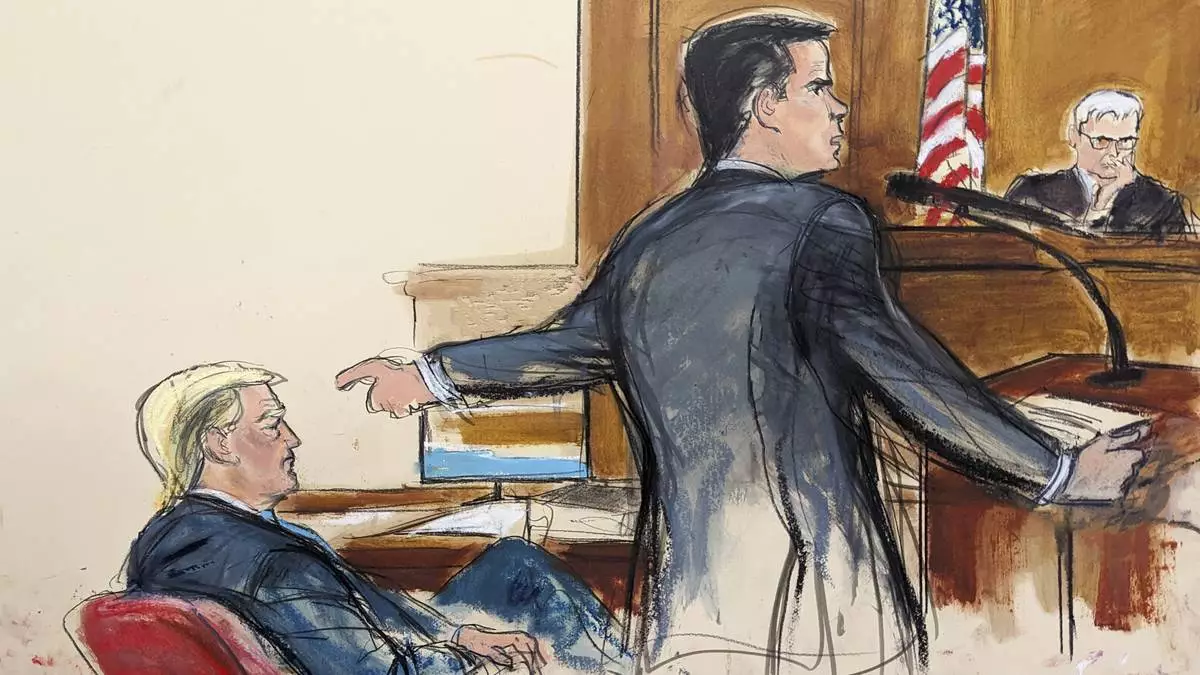
This artist depiction shows defense attorney Todd Blanche pointing at former President Donald Trump while giving his opening statement to the jury in Manhattan criminal court Monday, April 22, 2024, in New York. (Elizabeth Williams via AP)
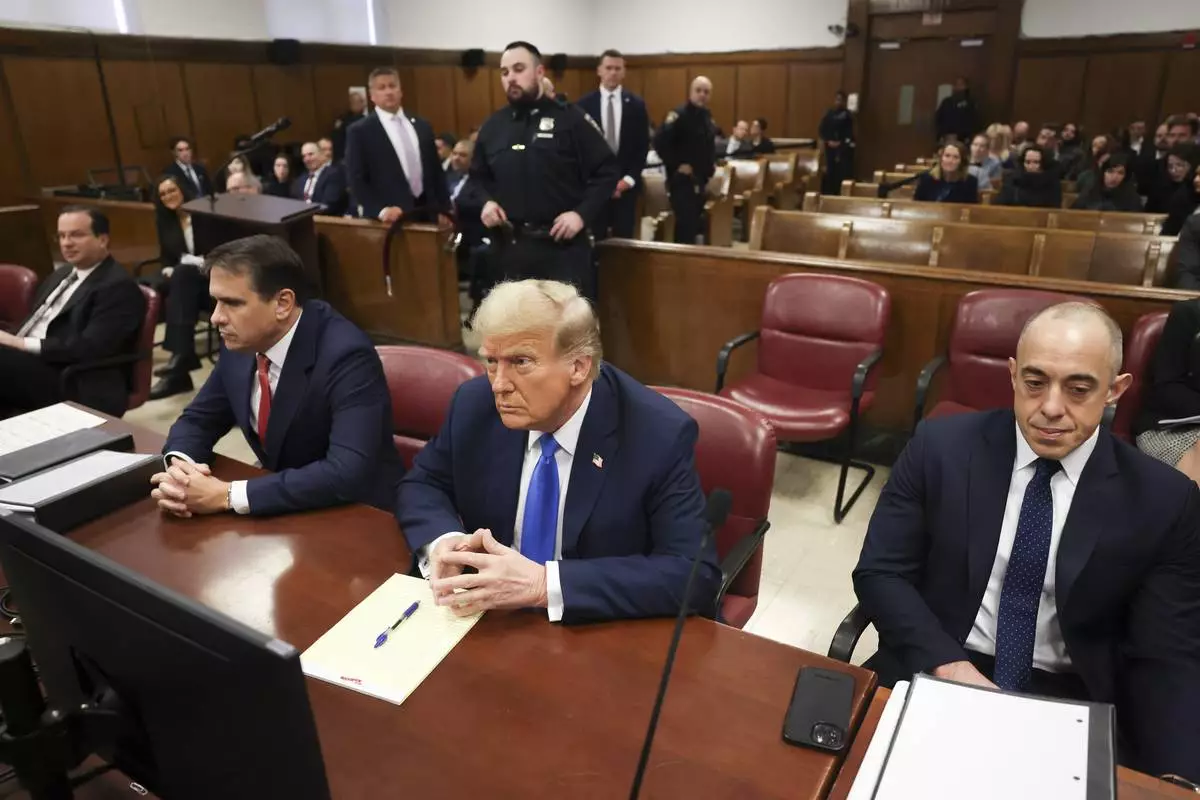
Former president Donald Trump, center, awaits the start of proceedings at Manhattan criminal court, Monday, April 22, 2024, in New York. Opening statements in Donald Trump's historic hush money trial are set to begin. Trump is accused of falsifying internal business records as part of an alleged scheme to bury stories he thought might hurt his presidential campaign in 2016. (AP Photo/Yuki Iwamura, Pool)







